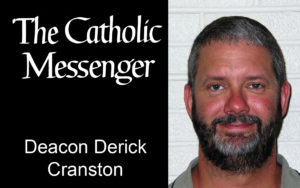By Deacon Derick Cranston
On Sept. 2, we had a funeral at St. Mary Parish in Riverside for a young man named Zac Yeggy. Zac lost his life to suicide. His mother Kelly has a message she would like the whole world to hear: mental illness is every bit a disease as any other disease. Particularly depression in men. It is as real as high blood pressure, as real as diabetes, and as real as cancer. Like cancer, if it is left untreated, it can kill.
I can speak from my personal experience that depression can be very alienating. It tends to make you feel like a stranger to others, a stranger to your family and even a stranger to yourself. The world begins to feel like a cold empty place devoid of any meaning. Even God seems to become more distant and unfeeling, as the writer of Psalm 88 so poignantly points out, “You plunge me into the bottom of the pit, into the darkness of the abyss. Because of you, friend and neighbor shun me; my only friend is darkness.”
 Zac’s mom hopes that her son’s struggle with depression and its tragic outcome will be a beacon that sheds light on the issue of depression and mental illness. A very brave thing for a mother to do. I have been very open with my own struggles with depression and anxiety and when Zac’s mom made her request, I did not hesitate. I have written about it in this newspaper, shared my experiences with young people when I was a youth minister, and have preached about it in homilies.
Zac’s mom hopes that her son’s struggle with depression and its tragic outcome will be a beacon that sheds light on the issue of depression and mental illness. A very brave thing for a mother to do. I have been very open with my own struggles with depression and anxiety and when Zac’s mom made her request, I did not hesitate. I have written about it in this newspaper, shared my experiences with young people when I was a youth minister, and have preached about it in homilies.
For those who suffer from depression, help is available through medication, therapy and support groups. But it is a message that must be shared again and again. Mental illness is unpleasant to speak about and there is some resistance to discuss it. Even in this day and age, a subconscious suspicion of weakness is associated with mental illness.
Think about it. During a job interview, if you shared a personal struggle with cancer that brought you to the brink of dying and yet you were able to overcome it, that would be considered a very admirable thing. You would be applauded for your strength and courage (and rightfully so). If you shared a personal struggle with depression that brought you to the brink of suicide, would it be met with the same admiration and respect?
For those who do speak out about the pain of mental illness and its effects on their lives, there is a lot of love and support from family, friends and loved ones. But on a collective level the stigma and taboo remain. If you do not think so, ask Zac’s mom. She shared the story of her son’s suicide on a social media site and received an outpouring of love and support. On the day of her son’s funeral the social media site took the page down.
The mind is the most precious gift God has given us. It is intertwined with our soul and is the only thing that no one can take away from you. You can be imprisoned, chained to a tree or lay paralyzed in a hospital room, but your thoughts are still your own. No one can get inside your mind. But when you suffer from depression, your mind becomes a dark prison. You are trapped and become enslaved to the bodily functions of chemical imbalances and damaged neurons.
Don’t lose hope. Great strides have been made in medical science and pharmacology over the last several years. People are becoming more open about the plight of mental illness; we need to keep the conversation going. Every time we speak about depression or mental illness or reach out to a loved one suffering from mental illness, we shed light on a misunderstood medical condition. This light will shine in the darkness…and the darkness shall not overcome it.
Men, depression, and suicide
According to the National Association of Mental Illness (NAMI) four out of five suicides are by white males and “a lot of men out there are suffering but most men aren’t showing up to get help.” The psychiatrists I have seen over the years tell me that for men, depression generally appears during their 40s and manifests itself in anger and hostility. Obtaining help is not simply a case of getting a prescription for a pill that will make you better. Everyone’s metabolism is different and reacts in different ways to different medications. More than likely it will be a process of trial and error to find the right combinations of medicines that will be most effective for you. It may also involve seeing a therapist. For more information about mental illness go to www.nami.org or call 1-800- 950-6264.
(Deacon Cranston is pastoral associate for St. Mary Parish in Riverside, Holy Trinity Parish in Richmond and St. Joseph Parish in Wellman. He can be reached at derickcranston@gmail.com.)











